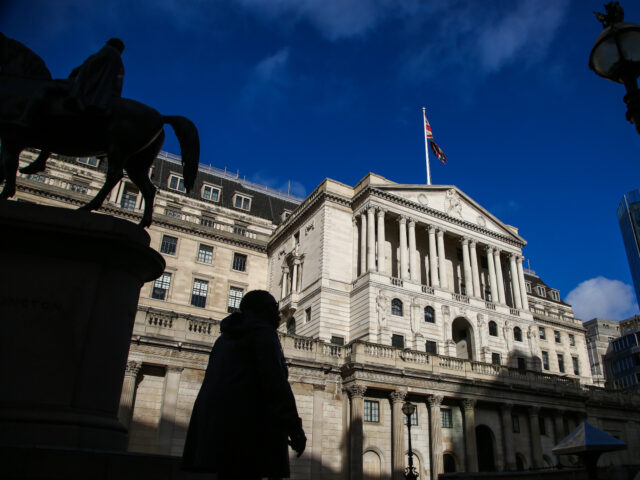The Bank of England predicted the United Kingdom will experience the longest recession in recorded history as the central bank once again raised interest rates to cope with the crippling inflation and as the supposedly Conservative government is preparing to again impose more taxes.
In addition to facing the prospect of higher tax bills under Chancellor Jeremy Hunt’s upcoming Autumn budget, Britons were informed by the Bank of England on Thursday that it would be raising interest rates by 0.75 per cent to 3 per cent, the largest single increase since in thirty years and puts the current rate on par with the aftermath of the 2008 global financial crisis.
To put the rate hikes in context, those households with a £200,000 standard variable mortgage may see their payments increase by as much as £1,000 a year if the Bank raises rates to 3 per cent.
The central bankers went on to predict that the UK will enter into the longest recession seen in a century, saying that the recession, which began in the third quarter of 2022 will last until at least midway through 2024. The predicted two-year recession is an increase from previous forecasts which forewarned of a 15-month downturn and would be the longest recession since records began in the 1920s.
Responding to the rate hikes, Finance Minister Jeremy Hunt said: “Inflation is the enemy and is weighing heavily on families, pensioners and businesses across the country. That is why this government’s number one priority is to grip inflation, and today the Bank has taken action in line with their objective to return inflation to target.
“Interest rates are rising across the world as countries manage rising prices largely driven by the Covid-19 pandemic and Putin’s invasion of Ukraine. The most important thing the British government can do right now is to restore stability, sort out our public finances, and get debt falling so that interest rate rises are kept as low as possible.”
UK Tax Burden to Hit Highest Levels Since 1940s, Chancellor Hunt Eyes £25bn in Hikes https://t.co/PFR6nqfv6t
— Breitbart London (@BreitbartLondon) October 30, 2022
The announcement comes as Rishi Sunak and finance chief Jeremy Hunt are reportedly planning on extending the windfall tax on oil and gas companies, despite warnings that this could drive away investment from Britain and thereby prolonging the UK’s reliance on foreign energy sources.
Despite suggesting during the leadership contest over the summer that he would not look to extend the windfall tax on energy firm profits, the prime minister is now said to be considering extending the tax in order to raise an estimated £40 billion over five years.
According to a report from the Times of London, Sunak and Hunt are preparing to increase the windfall tax rate from 25 per cent to 30 per cent and extend the tax from 2026, when it was initially due to expire, to 2028 in another effort to pay down the massive debt accumulated during the Chinese coronavirus crisis when Sunak went on a spending spree to pay peoples to stay home and businesses remain shuttered.
The plans, which would also see the the tax imposed on electricity generating firms, hope to raise an estimated £40 billion, however, it is unclear if that would actually be met given the volatility in the gas and energy markets. The proposals from the supposedly Conservative government mirror those proffered by the left-wing Labour Party and the Democrat Biden administration in the United States.
Rishi Sunak Caves In: Flying to COP27 Climate Talks After Allhttps://t.co/14Ev4Ukw63
— Breitbart London (@BreitbartLondon) November 2, 2022
Industry leaders have warned that the uncertainty surrounding extending the windfall tax will drive away investment from the UK, with the chief executive of Offshore Energies UK, Deirdre Michie writing to Chancellor Jeremy Hunt: “It is vital that HM Treasury offers industry and investors fiscal predictability and regulatory certainty to secure investment in the UK in low carbon energy.
“In the race to net-zero in 2050, the UK must be seen as a globally competitive market able to attract inflows of capital to maximise our domestic resources and anchor our world leading supply chain in the UK. We need a long-term approach and engagement from government if we are to build a secure, affordable, low carbon energy market in the UK.”
Though the UK only imports around 4 per cent of its natural gas from Russia, it is still heavily reliant on energy imports from countries like Belgium, France, and the Netherlands, meaning that it is vulnerable to the European energy crisis. Further exacerbating the future problems of being reliant on foreign energy, Prime Minister Sunak also used one of his first acts as leader to reverse to decision by Liz Truss to lift the ban on fracking in Britain.
The proposal for extending the windfall tax on energy comes as Chancellor Jeremy Hunt is preparing his Autumn budget for the Treasury. As opposed to the plans to lower taxes to stimulate economic growth from Liz Truss, who voters backed over Sunak in the summer leadership contest, Hunt is preparing to raise taxes yet again by a reported £25 billion. This would take the tax burden to the highest levels since the Second World War.
Inflation Nation: Recession to Last for Years in the UK, Warns Goldman Sachshttps://t.co/WNYr2dRXvO
— Breitbart London (@BreitbartLondon) August 30, 2022
Follow Kurt Zindulka on Twitter here @KurtZindulka

COMMENTS
Please let us know if you're having issues with commenting.